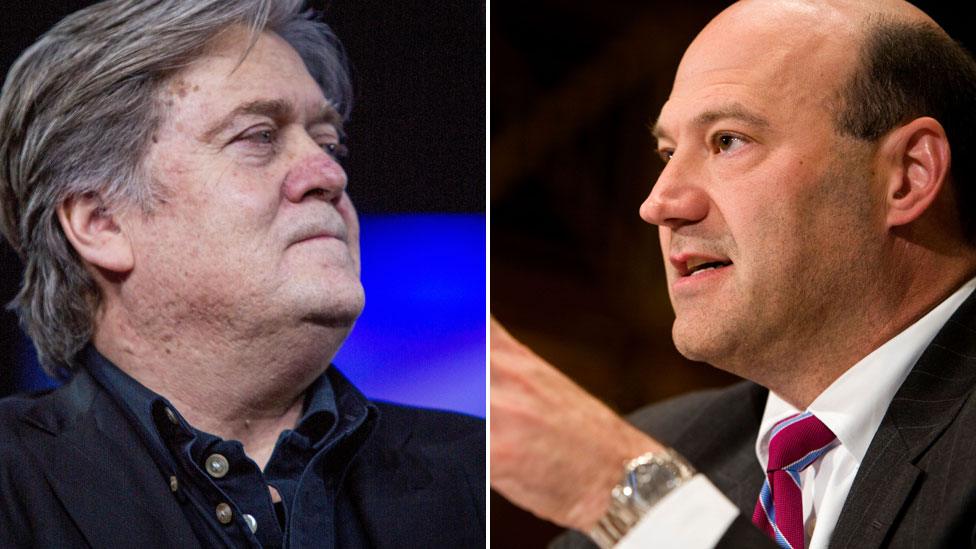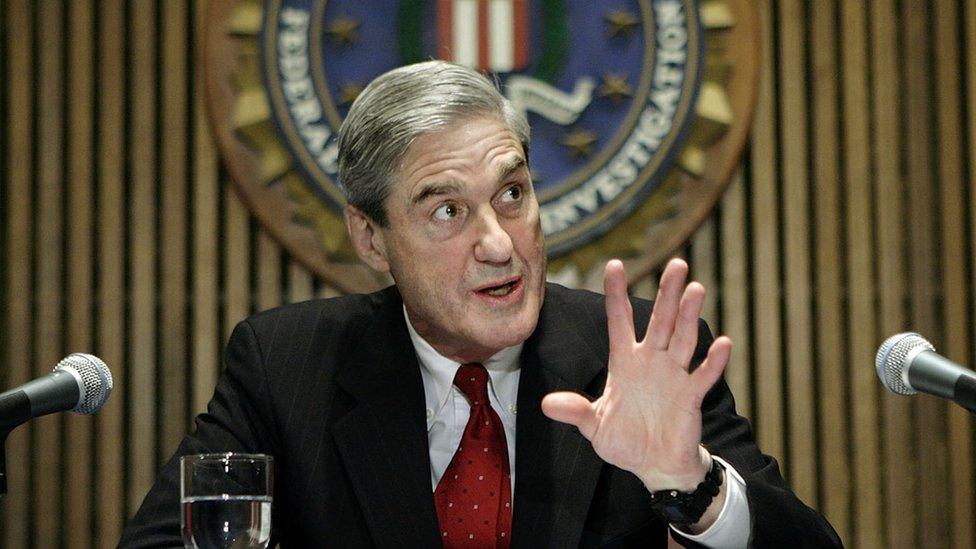Steve Bannon and Gary Cohn, two fierce rivals, shared one boss: Trump
- Published

Steve Bannon and Gary Cohn
This is the tale of two interviews with two of the biggest beasts of the first year of the Trump administration - and two fierce ideological rivals.
Steve Bannon was the architect of Trump's election victory - the fight-picking, take-no-hostages, burn-it-all-down, disruptor-in-chief - who brought that approach into the White House as chief strategist. Bannon was the leader of the "build the wall", immigration-limiting, tariffs-work brigade. He would describe himself as an economic nationalist; his many opponents would prefer to use the epithet "racist".
Gary Cohn is cut from a different cloth. As de facto number two at Goldman Sachs, he was once tipped to run one of the most powerful banks in the world. Then he was brought into the White House to head the National Economic Council, which advises the White House on global and domestic economic policy.
This was a hugely powerful position that he used to give Trump his biggest legislative victory since coming to office: the package of tax cuts that is being credited with boosting consumer demand and making US companies more competitive globally with the corporation tax cut.
To spend time with them as I have these past few days is to feel you have lived through the battles that shook the White House and still continue to divide Republicans. And the settings of the interviews were equally stark. So were their demeanours.
Bannon has the unkempt, shambolic look of one who has spent the night sleeping on a park bench. The dark blue shirt he was wearing looked as though it hadn't seen a washing machine in a good while - and had never met an iron. At one point, an aide fusses about a stain on the shirt. There were many she could have pointed to.
Steve Bannon defends Trump from racism accusations
When I said Cohn is cut from a different cloth, that is literally as well as figuratively. He is every inch the ex-Goldman Sachs exec. His suit is well tailored. The crisp, white shirt has his initials monogrammed beneath the left breast. The loafers look like they were made from alligator skin.
To meet Bannon, we travelled to New Mexico. Miles off the highway, you had to drive past an amusement park, and then go in a four-wheel drive vehicle on unmarked scorched, dry-as-dust tracks, through the sprawling land belonging to the American Eagle brick company, that lead you eventually to the border with Mexico. Roadrunners scuttle out of the way as we drive.
The first thing you see is a marquee and a couple of tents. Welcome to the "Symposium at the Wall: Cartels, Trafficking and Asylum". In the marquee with fans whirring, struggling against the odds to keep the stiflingly hot air circulating, an unusual bunch of right-wing politicians and supporters have gathered.
What they looked out on was a new stretch of border wall that had been privately funded. "Build the wall" was a slogan that got Donald Trump elected, but to this day very little construction has actually taken place - although a Supreme Court ruling a week ago will help the president in that endeavour.
Bannon revels in the furious reactions he provokes. Some would say he shouldn't be given a platform; that he is a racist and extremist. Certainly, after the interview aired, my Twitter feed lit up - in a not very positive way. Weren't we making his views respectable and bringing them into the mainstream?
Well, his views were what Donald Trump fought an election on, and having won - and pursued those policies in office - well, yes, I guess they are what some now say is the mainstream. They were what enough Americans voted for in the election to secure the 270 votes needed to win the electoral college. Also Bannon was at the very heart of this takeover of the Republican Party.
Steve Bannon: "The Brexit turmoil is only just beginning"
He is not a crank or an outsider, and he certainly isn't a nobody. He has been at the heart of government and remains very well connected to key decision makers in Washington. In our increasingly polarised politics, are we to say we are going to ignore people we don't like, and ban them from the airwaves? That, to me, is a very odd notion of free speech. It also shows a distinct lack of self-confidence. Surely our job is to hear different opinions - but at the same time challenge and scrutinise the arguments they are putting forward. The logical extension of banning Bannon is to ban Trump too. No?
I met Cohn, fittingly for this globalist and former banker, at a hotel on Wall Street. His world view is sharply different from Bannon's. He doesn't want to engage on camera over Trump's recent remarks that were seen as racist - although off camera one gets the impression that he was not overly impressed. And when he served at the White House, he expressed publicly his disapproval of the president's "There were fine people on both sides" remarks after the clashes in Charlottesville, when neo-Nazis chanted "Jews will not replace us." That led to a serious strain in their relationship.
Gary Cohn weighs in on US-China trade war
Cohn now only wants to talk about the economy. And he is less than flattering about the president's policies. He thinks the trade wars have created geopolitical uncertainty, which is stopping businesses from investing. Strikingly he also thinks that, for all the rhetoric, the trade war with China is hurting the US more than it is the Chinese.
Donald Trump won't like reading that. Cohn, though, delivered for the president on tax cuts and deregulation, one of the things that has given boosters to the US economy - unemployment at record lows, wages rising, consumer confidence increasing. Yes the tax cuts have disproportionately helped the rich - something, interestingly, that Bannon fought against.
Cohn represents a strain of economic thought that is much more centrist and in the mainstream, and much more consistent with America's free trading economic history. I have had very little pushback over interviewing Cohn. Bannon represents a much more combative, disruptive approach to economic policy.
To understand this unique administration we need to speak to and, yes, interview rigorously, the people at the heart of it.
- Published18 April 2019

- Published24 March 2019
- Published28 October 2018
- Published25 July 2018
